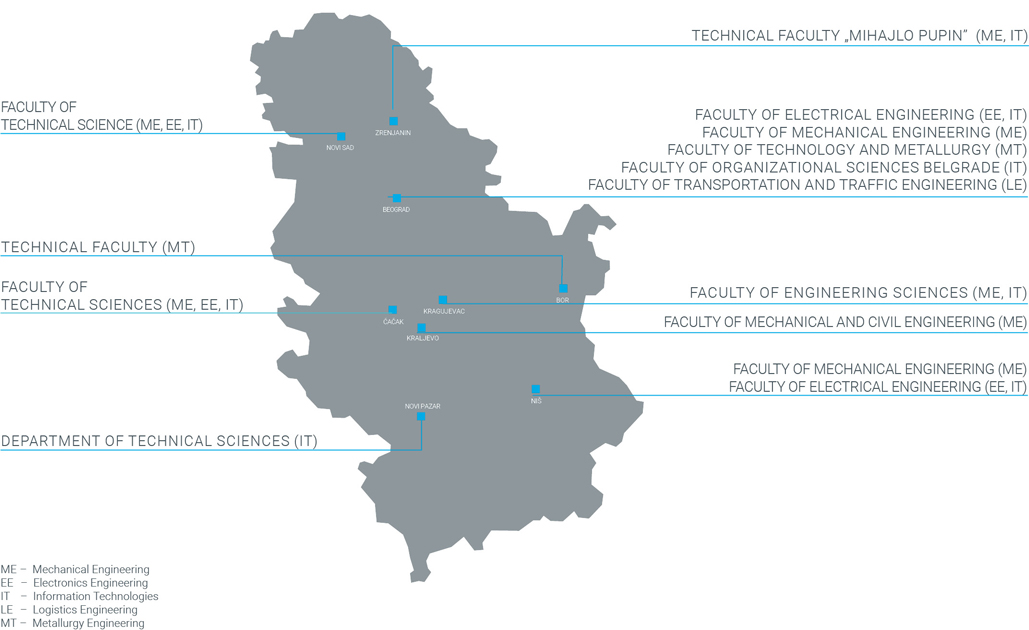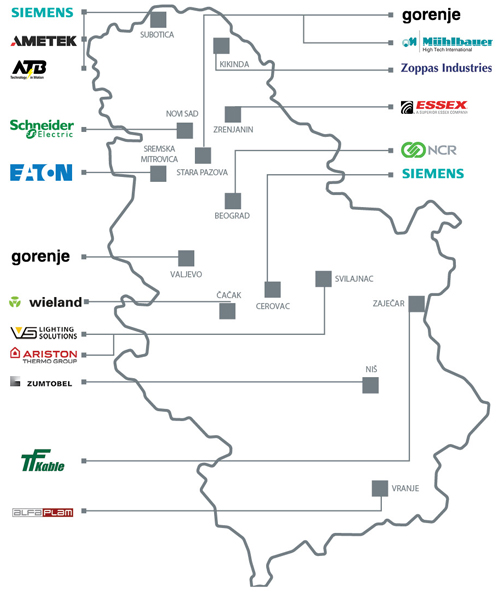
Our decision (invest in Serbia) was based on a high confidence to find a very motivated and skilled workforce, to have optimal logistic conditions from and to the other European countries, to develop an intense cooperation with technical schools and universities, and to build a strong partnership with national and local authorities.
Serbia’s electronics industry dates back to post World War II period when small-scale manufacturing of radio devices began throughout the former Yugoslavia. The evolution of electronics industry in the country really took off in the 60’s with formation of company Electronics Industry of Niš (EI Niš) as the leading force. At its peak in the 90es, EI Niš employed more than 28,000 people in more than 70 subsidiaries. Thus, city of Niš was rightly considered as Yugoslavian hub of electronics, with factories capable of producing entire scope of products, ranging from semiconductor components for electronic assembling to final products such as TV sets, sound systems, radios, optical instruments, measuring instruments and X-ray machines.
The ecosystem of electronics industry also encompassed formation of universities with comprehensive curriculum in electronics and electric engineering and R&D institutes situated at both academic institutions and with companies. All of this was combined with multitude of joint venture arrangements with leading international companies in the field.
In the new millenium, gradually a fresh sector of private SMEs started to flourish on the remains of the old giants while the role of the large companies was taken over by multinational brands looking to take advantage of experienced workforce and industrial heritage of the country.





















 IMI - In 2017 Dutch electronic goods manufacturer Cooperatief IMI Europe has opened a Design & Development Centre in Niš. Main activities are electronic design, mechanical design, software and product development, building platforms in the areas of automotive cameras, motor drives, and power modules.
IMI - In 2017 Dutch electronic goods manufacturer Cooperatief IMI Europe has opened a Design & Development Centre in Niš. Main activities are electronic design, mechanical design, software and product development, building platforms in the areas of automotive cameras, motor drives, and power modules.
 Continental - In 2018 the German company Continental opened a Research & Development center for vehicle interior and safety control systems in Novi Sad. Centre includes two business units that work on innovative products and solutions related to the future of the automotive industry. In less than three years from the foundation and start of work in 2017,
Continental - In 2018 the German company Continental opened a Research & Development center for vehicle interior and safety control systems in Novi Sad. Centre includes two business units that work on innovative products and solutions related to the future of the automotive industry. In less than three years from the foundation and start of work in 2017,
Continental Automotive Serbia has hired over 500 highly qualified engineers that develop electronic products for leading global passengers’ cars and commercial vehicles such as Mercedes, BMW, MAN, Volvo.
 Bosch - Activities of Robert Bosch in Serbia consist of production and R&D of automotive wiper systems, regional distribution and a series of services on the group level. Production and R&D are performed in Bosch factory located about 30 km from Belgrade in municipality called Pećinci. The plant that was initiated in 2012 today employs more than 1,100 workers and is constantly in expansion proces. Global group services are performed in Bosch Competence Center in Belgrade and include automotive aftermarket and software R&D activities.
Bosch - Activities of Robert Bosch in Serbia consist of production and R&D of automotive wiper systems, regional distribution and a series of services on the group level. Production and R&D are performed in Bosch factory located about 30 km from Belgrade in municipality called Pećinci. The plant that was initiated in 2012 today employs more than 1,100 workers and is constantly in expansion proces. Global group services are performed in Bosch Competence Center in Belgrade and include automotive aftermarket and software R&D activities.
 ZF Friedrichshafen - In 2018 The German engineering specialist ZF Friedrichshafen announced €160 million investment in an R&D centre in Pancevo. Focus is on the development and production of electric shafts for OEMs, including emobility electric motors, electronic and mechatronic gearboxes, microswitches and printed circuit boards. At the Pančevo plant, located 14 kilometers from capital, ZF Tech Center performs complex testing of electric drives including high temperature testing, functional testing and torque, power and efficiancy testing.
ZF Friedrichshafen - In 2018 The German engineering specialist ZF Friedrichshafen announced €160 million investment in an R&D centre in Pancevo. Focus is on the development and production of electric shafts for OEMs, including emobility electric motors, electronic and mechatronic gearboxes, microswitches and printed circuit boards. At the Pančevo plant, located 14 kilometers from capital, ZF Tech Center performs complex testing of electric drives including high temperature testing, functional testing and torque, power and efficiancy testing.
While cars are becoming “ultimate electronics devices” automotive electronics is becoming key component of both Serbian electronics and automotive industries.
Knowing that, it is no accident that the major share of electronics companies in Serbia are related to the automotive electronics and that it is the sector that is attracting majority of foreign investments in Serbia. The leaders without a doubt are industrial giants coming from Germany – Bosch, Continental, ZF Friedrichshafen, Brose, accompanied with the leading brand in the field of electric motors – Hong Kong based Johnson Electric.
To say that these companies are producing state of the art electronics and mechatronics automotive systems is not enough since they have also implemented their R&D centers in Serbia and are using today much sought-after engineers coming from Serbian technical universities.
This segment od e-industry is dominated by large-scale multinational companies that found fruitful footing in Serbian availability of educated workforce and electronics industry heritage.
The segment encompasses production of home appliances (Gorenje- Hisense group), production of components such as heaters (Zoppas Industries and Ariston Thermo Group), then large group of products revolves around electric motors or vice versa electric generators (Siemens, Ametek ATB) and product group related to the lighting equipment (Zumtobel Group, Vossloh-Schwabe) and domain of switches, fuses, relays and connectors (Eaton Corporation).

Companies are mostly in local ownership and are true Serbian brands. As such this segment represents the backbone of electronics sector in Serbia, mostly localeven though their visibility is often not as prominent as with the large companies.
Typical product groups can vary a lot - From sophisticated electronics such as design and production of embedded electronics, microcontrollers, PCB, wireless connectivity devices (Mikroelektronika, Tagor, Geneco, Iritel, EI PCB), or wiring, connectors and switches (TF Kabel, Wieland Electric, Feman, Bizlink, Aling Conel, Elrad) and home appliances (MBS or Metalac Bojleri), to the interesting segment of companies that work in niche fields like medical devices, optics, signaling equipment or measuring devices (Prizma, LMB Soft, INSA or Harder Digital).